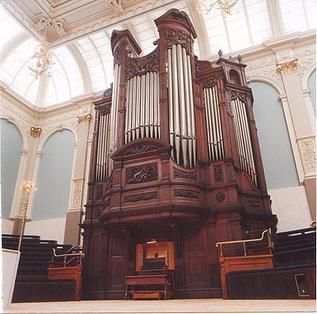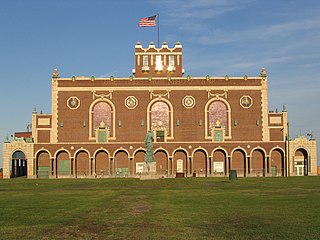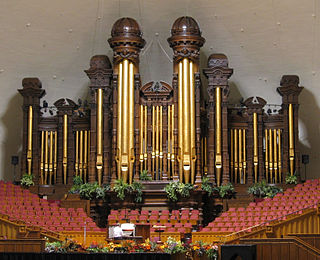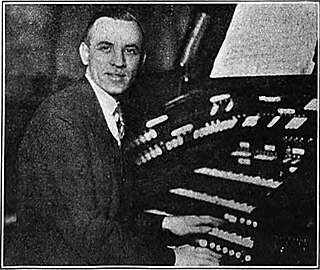Related Research Articles

Casavant Frères is a Canadian organ building company in Saint-Hyacinthe, Quebec, which has been building pipe organs since 1879. As of 2014, the company has produced more than 3,900 organs.

Jim Whelan Boardwalk Hall, formerly known as the Historic Atlantic City Convention Hall, is a multi-purpose indoor arena in Atlantic City, New Jersey. It was Atlantic City's primary convention center until the opening of the Atlantic City Convention Center in 1997. Boardwalk Hall was declared a U.S. National Historic Landmark in 1987 as one of the few surviving buildings from the city's early heyday as a seaside resort. The venue seats 10,500 people for ice hockey, and at maximum capacity can accommodate 14,770 for concerts. Boardwalk Hall is the home of the Miss America Pageant.
Mathias Peter Møller, commonly known as M.P. Möller or Moeller, was a prolific pipe-organ builder and businessman. A native of the Danish island of Bornholm, he emigrated to the United States in 1872 and founded the M.P. Moller Pipe Organ Company in Greencastle, Pennsylvania, in 1875. The city of Hagerstown, Maryland, took notice of Möller's early successes and induced him to move his business there in 1881 to help make it a viable business center in Western Maryland. The company remained in business in Hagerstown until 1992, with hundreds of employees at its peak and a lifetime production of over 12,000 instruments.

An organ pipe is a sound-producing element of the pipe organ that resonates at a specific pitch when pressurized air is driven through it. Each pipe is tuned to a note of the musical scale. A set of organ pipes of similar timbre comprising the complete scale is known as a rank; one or more ranks constitutes a stop.

Henry Willis & Sons is a British firm of pipe organ builders founded in 1845. Although most of their installations have been in the UK, examples can be found in other countries.

Austin Organs, Inc., is a manufacturer of pipe organs based in Hartford, Connecticut. The company is one of the oldest continuously-operating organ manufacturers in the United States. The first instruments were built in 1893 with the Austin Patent Airchest, and many remain in fine playing condition to this day.
Ophicleide and Contra Ophicleide are powerful pipe organ reed pipes used as organ stops. The name comes from the early brass instrument, the ophicleide, forerunner of the euphonium.

The Boardwalk Hall Auditorium Organ is the pipe organ in the Main Auditorium of the Boardwalk Hall in Atlantic City, New Jersey, built by the Midmer-Losh Organ Company. It is the largest organ in the world, as measured by the number of pipes.

St. Agnes Cathedral is a Roman Catholic Cathedral in Rockville Centre, New York, on Long Island. It is the seat of the Diocese of Rockville Centre. The Most Reverend John Oliver Barres is the ordinary bishop of the Diocese and pastor of the Cathedral parish. The Saint Agnes Cathedral School is on campus with the Cathedral.
ACX1 Studios is a four-story 500,000-square-foot multiuse facility on a beach pier on the boardwalk in Atlantic City, New Jersey. The pier has hosted a variety of attractions and shopping experiences since it was first built in the early twentieth century. The pier is expected to reopen as a film production studio and entertainment venue in 2024 to host film shoots attracted to the robust South Jersey-specific film tax credits.

Asbury Park Convention Hall is a 3,600-seat indoor exhibition center located on the boardwalk and on the beach in Asbury Park in Monmouth County, New Jersey. It was built between 1928 and 1930 and is used for sports, concerts and other special events. Adjacent to the Convention Hall is the Paramount Theatre; both are connected by a Grand Arcade. Both structures are listed in the National Register of Historic Places.
Marcussen & Søn, also known as Marcussen and previously as Marcussen & Reuter, is a Danish firm of pipe organ builders. They were one of the first firms to go back to classical organ-building techniques, and have been producing mechanical-action organs since 1930. Aside from their many instruments in Denmark, they have built organs in northern Germany, Sweden, Finland, the Netherlands, Great Britain, South Africa, Japan, and the United States.

The Salt Lake Tabernacle organ is a pipe organ located in the Salt Lake Tabernacle in Salt Lake City, Utah. Along with the nearby Conference Center organ, it is typically used to accompany the Tabernacle Choir at Temple Square and is also featured in daily noon recitals. It is one of the largest organs in the world. Jack Bethards, president and tonal director of Schoenstein & Co., describes it as an "American classic organ" and "probably one of the most perfect organs ever built."

The Estey Organ Company was an organ manufacturer based in Brattleboro, Vermont, founded in 1852 by Jacob Estey. At its peak, the company was one of the world's largest organ manufacturers, employed about 700 people, and sold its high-quality items as far away as Africa, Great Britain, Australia, and New Zealand. Estey built around 500,000 to 520,000 pump organs between 1846 and 1955. Estey also produced pianos, made at the Estey Piano Company Factory in New York City.

The Kahl Building is a historic building located in Downtown Davenport, Iowa, United States. It was listed on the National Register of Historic Places in 1983. In 2020 it was included as a contributing property in the Davenport Downtown Commercial Historic District. The building also includes the Capitol Theatre.
This is a list of stops for the Boardwalk Hall Auditorium Organ, the largest pipe organ in the world as measured by number of pipes. The organ is located in the main auditorium of Boardwalk Hall in Atlantic City, New Jersey. The organ was built by the Midmer-Losh Organ Company between 1929 and 1932.

Holy Name Church in West Roxbury is a Roman Catholic church of the Archdiocese of Boston.

Hinners Organ Company was an American manufacturer of reed and pipe organs located in Pekin, Illinois. Established in 1879 by German-American John Hinners, the firm grew through several partners, becoming Hinners & Fink in 1881, Hinners & Albertsen in 1886, and Hinners Organ Company in 1902. In the 1920s Hinners established a subsidiary, the Illinois Organ Supply Company, which mass-produced parts for Hinners and other firms. Business declined in the 1930s due to the Great Depression, changing technology, and increasing competition. Hinners became a service company in 1936 and closed in 1942.

Frederick Kinsley was a theatre organist and early recording artist for Edison Records in the 1920s. He was one of the first organists to be recorded on acoustical record following the advent of the technology.
References
- ↑ Ochse, Orpha (1988). The History of the Organ in the United States. Bloomington: Indiana University Press. pp. 278–279. ISBN 978-0253204950 . Retrieved July 10, 2020.
- ↑ Grand Ophicleide Issue 27, page 6. Archived 2012-03-11 at the Wayback Machine
- ↑ "Opus Database". Theatre Organs.com. Retrieved July 10, 2020.
- ↑ Swisher, Charles; Carl Loeser (July 21, 2009). "Atlantic City Boardwalk Hall's Midmer-Losh Organ: An Update". The Diapason . Retrieved July 10, 2020.